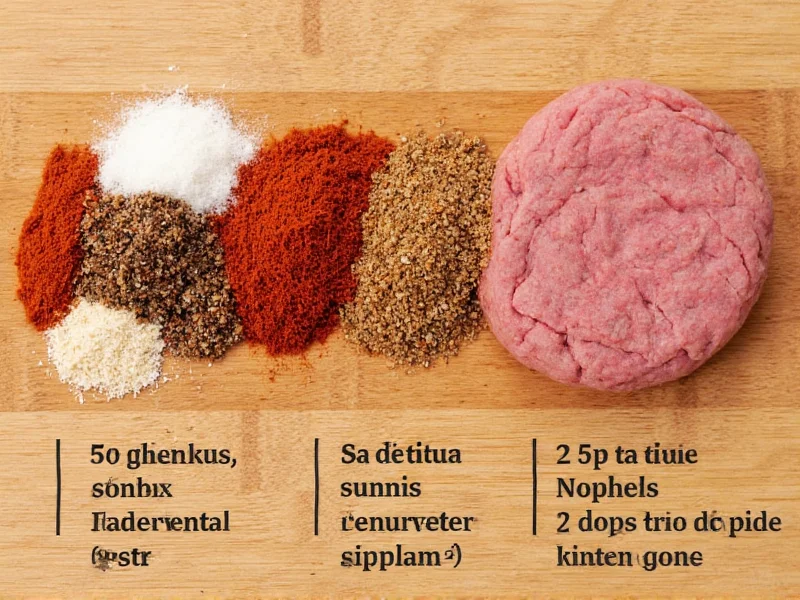Creating exceptional burgers starts with the right seasoning blend. While store-bought mixes offer convenience, they often contain fillers, excessive salt, and artificial ingredients that compromise flavor and texture. Homemade hamburger seasoning gives you complete control over ingredients, allowing customization for dietary needs and personal taste preferences. Professional chefs consistently recommend making your own blends because fresh spices significantly enhance the natural beef flavor without overpowering it.
Understanding Hamburger Seasoning Components
Effective hamburger seasoning balances four key elements: salt for flavor enhancement, aromatics for depth, heat for complexity, and umami boosters for meatiness. Unlike steak seasoning which can be more aggressive, hamburger seasoning must complement ground beef's texture without drawing out moisture. The finest blends use a 3:2:1 ratio of base spices (like paprika), aromatics (garlic and onion), and accent flavors (pepper and herbs). This scientific approach to homemade burger seasoning mix proportions ensures consistent results every time.
Four Chef-Tested Hamburger Seasoning Recipes
These best hamburger seasoning recipe for grilling variations have been tested across multiple beef blends and cooking methods. Each recipe yields enough seasoning for 2 pounds of ground beef, with precise measurements for restaurant-quality results at home.
| Seasoning Type | Core Ingredients | Special Additions | Best For |
|---|---|---|---|
| Classic American | 2 tbsp paprika, 1 tbsp garlic powder, 1 tbsp onion powder, 2 tsp salt, 1½ tsp black pepper | 1 tsp mustard powder, ½ tsp celery seed | Traditional backyard BBQs, diner-style burgers |
| Smoky Southwest | 1½ tbsp smoked paprika, 1 tbsp cumin, 2 tsp garlic powder, 1½ tsp salt | 1 tsp chipotle powder, ½ tsp oregano, ¼ tsp cocoa powder | Grilled burgers, Tex-Mex inspired meals |
| Spicy Cajun | 1 tbsp paprika, 2 tsp garlic powder, 2 tsp onion powder, 1½ tsp salt | 1½ tsp cayenne, 1 tsp thyme, 1 tsp oregano, ½ tsp white pepper | Blackened burgers, spicy cheese pairings |
| Gourmet Herb | 2 tsp sea salt, 1½ tsp black pepper, 1 tbsp dried parsley | 2 tsp rosemary, 1½ tsp thyme, 1 tsp sage, ½ tsp lemon zest | High-end beef blends, indoor cooking |
Perfect Seasoning Application Technique
Knowing how much seasoning per pound of ground beef matters as much as the blend itself. For optimal results, use 1½ to 2 tablespoons of seasoning mix per pound of meat. Gently fold the seasoning into the beef using your fingertips—never overmix, as this compacts the meat and creates tough burgers. Season immediately before cooking; adding salt too early draws out moisture, resulting in less juicy burgers. When forming patties, create a slight indentation in the center to prevent bulging during cooking.
Storage and Customization Tips
Store your make your own hamburger seasoning without fillers in an airtight container away from light and heat. Properly stored, dry blends maintain peak flavor for 3-4 months. For those monitoring sodium intake, reduce salt by 25-50% and compensate with additional umami-rich ingredients like dried mushrooms or nutritional yeast. If you prefer fresh ingredients, substitute 3 parts dried herbs with 9 parts fresh (e.g., 1 teaspoon dried thyme = 1 tablespoon fresh thyme), but add these just before cooking to prevent moisture issues.
Advanced Flavor Development
For simple hamburger spice blend for juicy burgers with extraordinary depth, consider these professional techniques: Bloom spices in 1 teaspoon of oil before mixing with meat to activate flavor compounds. Add 1 teaspoon of Worcestershire sauce per pound of meat for enhanced umami without making the mixture wet. For smoky flavors without a grill, incorporate ¼ teaspoon liquid smoke into the seasoning mix. Remember that fat content affects seasoning absorption—leaner blends (90/10) require 20% more seasoning than standard 80/20 ground beef.
Frequently Asked Questions
Can I use hamburger seasoning for other meats?
Yes, most hamburger seasoning blends work well with other ground meats like turkey, chicken, or lamb. Reduce the amount by 25% for leaner meats as they absorb flavors differently. For steak or roasts, increase black pepper and add more robust herbs like rosemary. The classic American blend particularly enhances meatloaf and meatball recipes.
How long does homemade seasoning last?
Properly stored in an airtight container away from light and moisture, dry hamburger seasoning maintains optimal flavor for 3-4 months. After 6 months, spices gradually lose potency but remain safe to use. To extend freshness, add whole spices like peppercorns to your blend and grind them just before use. Never store seasoning blends in the refrigerator as moisture causes clumping and flavor degradation.
Should I adjust seasoning for different cooking methods?
Absolutely. For grilling, increase smoky elements by 20% to compensate for flavor loss to flames. When cooking indoors, boost aromatic components like garlic and onion powder by 15% since you won't get smoke infusion. For cast-iron cooking, reduce salt by 10% as the seasoning in the pan contributes additional flavor. Always apply seasoning differently based on method—mix into meat for grilling, but apply to surface only for high-heat indoor cooking to prevent burning.
Can I make low-sodium hamburger seasoning?
Yes, create a low-sodium version by replacing salt with equal parts nutritional yeast and citric acid (¼ teaspoon each per teaspoon of salt removed). Increase umami-rich ingredients like dried mushrooms (¼ teaspoon per pound) and smoked paprika (½ teaspoon extra). Add 1 teaspoon of tomato paste per pound of meat for natural sodium enhancement without added salt. Remember that potassium-based salt substitutes can create metallic flavors in burgers, so use them sparingly.
Why shouldn't I mix seasoning too thoroughly?
Overmixing seasoning into ground beef damages the protein structure, resulting in dense, tough burgers. The goal is even distribution without compacting the meat. Use a light folding motion with your fingertips for no more than 30 seconds. Properly mixed burgers should still show visible streaks of seasoning and maintain loose texture. This technique preserves the meat's natural moisture pockets, yielding juicier results regardless of your hamburger seasoning recipes choice.











 浙公网安备
33010002000092号
浙公网安备
33010002000092号 浙B2-20120091-4
浙B2-20120091-4